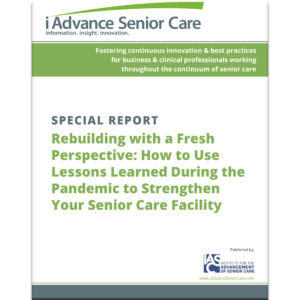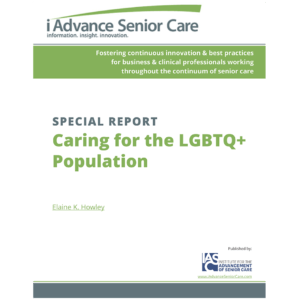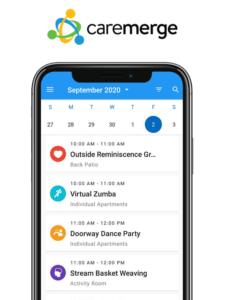What the election results mean for you
When the 114th Congress convenes in January, the Senate will have a new Republican majority and the House will have an expanded majority. At the state level, more states will have governors who are Republicans. What these changes mean for seniors housing and services providers remains to be seen, but several leaders of associations representing those in the industry recently shared their thoughts with Long-Term Living, and their expectations are mixed.
 On the plus side, says Maribeth Bersani, senior vice president of public policy and interim CEO of the Assisted Living Federation of America (ALFA): “We typically think, I suppose, of Republicans not being as quick to develop regulations and oversight, so certainly at the federal level…with the Republicans now in charge, we probably won’t have to worry about that for a while.” The impact of the gubernatorial elections is less clear, she says.
On the plus side, says Maribeth Bersani, senior vice president of public policy and interim CEO of the Assisted Living Federation of America (ALFA): “We typically think, I suppose, of Republicans not being as quick to develop regulations and oversight, so certainly at the federal level…with the Republicans now in charge, we probably won’t have to worry about that for a while.” The impact of the gubernatorial elections is less clear, she says.
Len Russ, chair of the American Health Care Association (AHCA), also is optimistic.
 “If nothing else, what we’ve heard so far is that there is at least initially some momentum toward action as opposed to the stalemate we’ve seen over the last number of years,” he says. “And if there is such a momentum, then we can try to capitalize on that for the good of the system, for the good of the taxpayers and, most importantly, for the good of the providers and the [entitlement program] beneficiaries…we serve.”
“If nothing else, what we’ve heard so far is that there is at least initially some momentum toward action as opposed to the stalemate we’ve seen over the last number of years,” he says. “And if there is such a momentum, then we can try to capitalize on that for the good of the system, for the good of the taxpayers and, most importantly, for the good of the providers and the [entitlement program] beneficiaries…we serve.”
That hopefulness is tempered with the desire to clarify how providers, facing new payment models while trying to meet increasing quality goals, will be paid in the future, Russ says. “We are focused very much now on trying to, when the new Congress is seated, come up with some payment reform proposals that will be lasting and enduring and satisfy regulators as well as legislators,” he adds.
 The not-for-profit members of LeadingAge also are trying to find ways to adapt to a world in which new business models are growing and some federal programs are shrinking, President and CEO Larry Minnix says, and the association also hopes to find ways to address those challenges.
The not-for-profit members of LeadingAge also are trying to find ways to adapt to a world in which new business models are growing and some federal programs are shrinking, President and CEO Larry Minnix says, and the association also hopes to find ways to address those challenges.
“A lot of the big issues that face our world, like health reform and housing policy and human services delivery mechanism and those kind of things, [don't have] slap-dash solutions…but there are things that could clearly be done,” he says. “We’ve talked to enough individual members of Congress on both sides of the aisle, and certainly we’ve had a good relationship with the administration, to know that there are people willing to make changes. But people willing to stick their neck out is another matter.”
Clif Porter, senior vice president of government relations for AHCA, expects Congress to attempt to make changes related to the Affordable Care Act, although he doesn’t expect a full repeal. “In some ways it may be beneficial and in some ways it may hurt our employees,” he says. “It’s not clear exactly how that will look until we actually see some of these ideas and proposals.”
 As for providers, Porter says that the industry may have opportunities to address entitlement reform and other issues, and he anticipates “big ideas” coming from Wisconsin Rep. Paul Ryan, the likely chairman of the House Ways and Means Committee, and others. “I think there’s going to be a lot of ideas that are going to be more about, how do we better allocate the existing resources that we have?” he says. “In our setting, I think that’s a positive, because when you look at our services, we’re the low-cost provider of services within the healthcare spectrum. So if there is a reallocation, the incentives would be to move patients down the continuum, for lack of a better term, more quickly, and those are the kinds of concepts and ideas that Republicans tend to embrace.”
As for providers, Porter says that the industry may have opportunities to address entitlement reform and other issues, and he anticipates “big ideas” coming from Wisconsin Rep. Paul Ryan, the likely chairman of the House Ways and Means Committee, and others. “I think there’s going to be a lot of ideas that are going to be more about, how do we better allocate the existing resources that we have?” he says. “In our setting, I think that’s a positive, because when you look at our services, we’re the low-cost provider of services within the healthcare spectrum. So if there is a reallocation, the incentives would be to move patients down the continuum, for lack of a better term, more quickly, and those are the kinds of concepts and ideas that Republicans tend to embrace.”
But the industry still remains vulnerable to cuts, especially those related to Medicare reimbursement rates and provider assessments used to fund Medicaid, Porter says. “There are areas that Republicans and Democrats alike might think are ripe for savings, and we’ve got to be, obviously, on our guard for that as well,” he says. “Particularly when folks are gridlocked, the tendency is just to cut stuff versus to really think through real solutions.”
Cheryl Phillips, MD, senior vice president of public policy and advocacy for LeadingAge, predicts “a focus on resolving the doc fix, the [sustainable growth rate], which will mean therapy caps, probably, as part of it” as well as “a greater focus on value-based purchasing and quality measures across the continuum” and further expansion of managed Medicaid for long-term services and supports.
 “I don’t think that our appropriations for housing are going to get much better in the short term,” she adds. “I don’t think our appropriations for things like the Older Americans Act are necessarily going to get better. We’re just hoping that it doesn’t get any worse. It’s going to be an interesting ride starting in 2015.”
“I don’t think that our appropriations for housing are going to get much better in the short term,” she adds. “I don’t think our appropriations for things like the Older Americans Act are necessarily going to get better. We’re just hoping that it doesn’t get any worse. It’s going to be an interesting ride starting in 2015.”
Regardless of what happens legislatively come January, one thing association leaders agree on is that the new members of Congress will need to be informed on the issues of importance to those who serve older Americans.
 “We have a lot of new people to educate,” says ALFA’s Bersani. “You build relationships with staff and members, and then when there’s a big change, you just have to start all over again.”
“We have a lot of new people to educate,” says ALFA’s Bersani. “You build relationships with staff and members, and then when there’s a big change, you just have to start all over again.”
Niles Godes, senior vice president of housing and capital for LeadingAge, echoes her comment. “It’s always necessary when a person is doing this type of advocacy to educate new members of Congress on the issues,” he says, adding that LeadngAge will be watching to see who ends up heading the major committees and subcommittees. “There certainly are a large number of folks coming in, so we'll be working to get in and see them to explain the problems and the potential solutions.”
I Advance Senior Care is the industry-leading source for practical, in-depth, business-building, and resident care information for owners, executives, administrators, and directors of nursing at assisted living communities, skilled nursing facilities, post-acute facilities, and continuing care retirement communities. The I Advance Senior Care editorial team and industry experts provide market analysis, strategic direction, policy commentary, clinical best-practices, business management, and technology breakthroughs.
I Advance Senior Care is part of the Institute for the Advancement of Senior Care and published by Plain-English Health Care.
Related Articles
Topics: Advocacy , Articles , Executive Leadership











